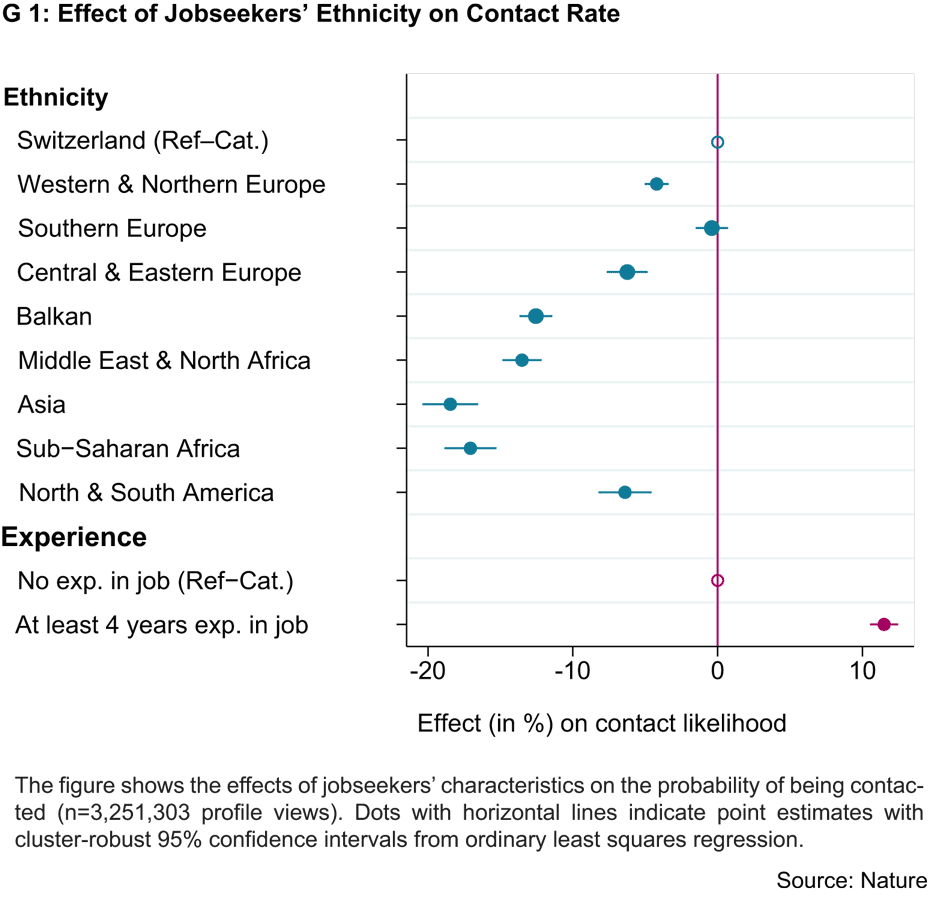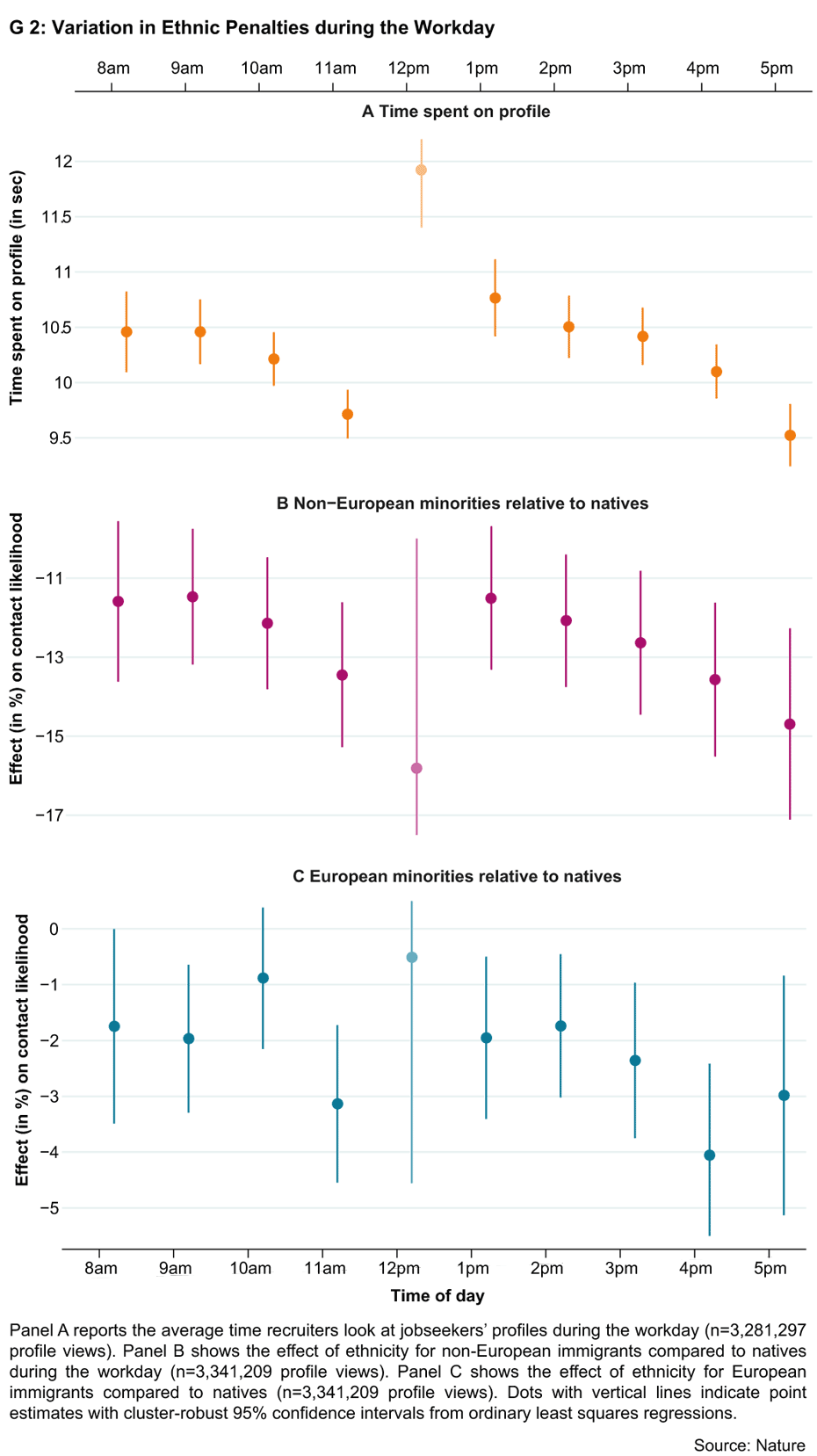"There is more discrimination before lunch and after work"
- Labour Market
- KOF Bulletin
Using a new method, researchers from KOF and ETH have for the first time studied how discrimination occurs on online job boards. They are able to show that discrimination based on origin is widespread – and that the time of day plays a key role. So do online platforms increase discrimination in job searches or, on the contrary, can they be used to create more fairness? Co-author Daniel Kopp discusses the most important findings.

Job-Room is one of the largest online job exchanges in Switzerland. More than 150,000 jobseekers have created a profile here. Companies can search for staff to fill vacancies on the platform, click through the jobseekers' profiles and contact them directly. How do they go about it? Which profiles do they look at, how long do they stay on these profiles – and which candidates do they want to meet in the end? To answer these questions, KOF researchers Daniel Kopp and Michael Siegenthaler teamed up with Dominik Hangartner from the ETH Immigration Policy Lab and analysed the click data on the platform.
Mr Kopp, online platforms are becoming increasingly important in the recruitment of staff. You have investigated whether any discrimination occurs in this process. What did you find out?
Discrimination – on the basis of origin, for example – is relatively widespread. Foreign candidates are, on average, contacted by recruiters on the platform 6.5 per cent less frequently than Swiss candidates with otherwise identical attributes. The differences between the various groups are also considerable: jobseekers from Asia and sub-Saharan Africa are contacted 18 per cent less frequently, while those from the Balkans and eastern European countries are contacted 13 per cent less (see G 1). These findings confirm previous research. However, our method enabled us to go further.
In what way?
Discrimination in job searches to date has mainly been investigated by using so-called correspondence studies. In these studies, researchers send fictitious CVs to recruiters that are identical except for one attribute, such as origin. They then record which applicants are invited for interview. For resource reasons, however, this method has to be limited to a small number of applications and just a few professions. By using our method, on the other hand, we can examine discrimination in many different occupations and also analyse the entire search process on the platform. We know which candidates are displayed to a recruiter, when and for how long she visits a profile and whether she wants to make contact; in other words, we observe millions of decisions. This allows us to gain completely new insights.

Which findings surprised you the most?
We were able to show that the level of discrimination varies throughout the day. Recruiters look at profiles for less time – and discriminate more – before lunch and after work. This means that the same person makes different decisions depending on the time of day (see G 2). This finding suggests that unconscious biases – such as stereotypes of minorities – also contribute to discrimination. They play a role especially when we are exhausted and want to call it a day.

What are the long-term consequences of this kind of discrimination?
One direct consequence is that foreigners may remain unemployed for longer than Swiss candidates with the same qualifications. In fact, we find evidence of longer periods of unemployment among jobseekers who belong to ethnic minorities. Our findings suggest that discrimination is a major reason for this. It is to be expected that longer-term unemployment also results in other labour market outcomes. For example, we know from previous studies that longer periods of unemployment subsequently lead to lower wages.
The study shows that both genders are disadvantaged when looking for a job: men in typical female roles and women in typical male roles. Why is this still the case?
These findings suggest that gender-specific stereotypes are internalised by the recruiters studied: in other words, there is still the view that women are better suited to certain professions than men and vice versa. This leads to a situation whereby occupation-specific segregation remains or is even reinforced. For example, if a man has difficulty finding a job in a ‘typical female profession’ – such as nursing or childcare – he may give up looking for employment in this field.
Online platforms such as Job-Room are being used more and more. So will discrimination in recruitment also increase?
We do not believe so. We have no evidence to suggest that discrimination is more prevalent on such platforms than in other recruitment processes. This is shown, for example, by the correspondence studies mentioned at the beginning. Discrimination is really a structural and social problem that is reflected throughout the labour market. With online portals, however, we can use the existing data to examine such discrimination in detail.
So is the opposite perhaps the case, namely that these portals can lead to a decrease in discrimination?
That is quite conceivable. Portals like Job-Room are not just a suitable laboratory for detecting discrimination; they also offer the possibility to test different countermeasures. There are several levels on which discrimination can be fought. We focus on how the application process can be made fairer and more transparent. Attributes strongly linked to performance – such as education and work experience – could be presented more prominently than those that only allow conclusions to be drawn about a certain group affiliation, such as name, gender or origin. Such changes can be made in all recruitment channels but are particularly easy to implement on online platforms. If the most suitably qualified person is invited to the interview, this promotes equal opportunities as well as benefiting the recruiters.
What is the significance of your findings for the labour market and society as a whole?
Personally, I think the results suggest that social power relations also play a role in labour market decisions. At the same time, our findings on gender discrimination indicate that segregation in the labour market can also reinforce social stereotypes. Economic decisions therefore have social consequences, and social conditions influence the economy.
What does the publication of your work in the journal Nature mean?
Nature is one of the most highly renowned journals worldwide and stands for high-quality research that is relevant to many disciplines. Studies published there often achieve great visibility – in the research community and beyond. We therefore hope that we can reach as many people as possible with our research and that decision-makers in politics and business take our findings into account.
The full publication in "Nature" can be found external page here.
Contacts
KOF Konjunkturforschungsstelle
Leonhardstrasse 21
8092
Zürich
Switzerland
KOF Konjunkturforschungsstelle
Leonhardstrasse 21
8092
Zürich
Switzerland
Professur für Politikanalyse
Leonhardshalde 21
8001
Zürich
Switzerland